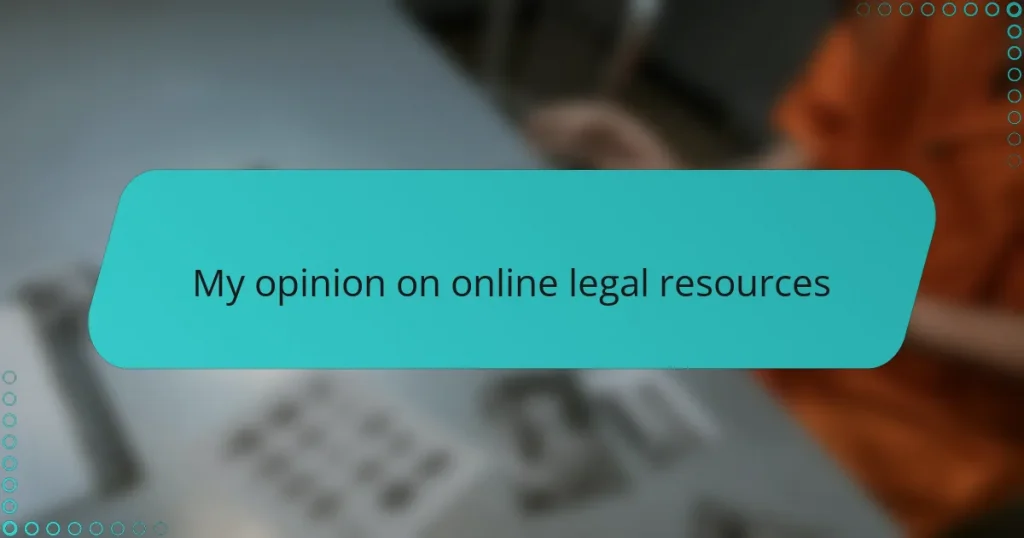Key takeaways
- Online legal resources offer vast access to information, with tools such as case law databases simplifying legal research.
- Credibility is crucial; always verify sources for accuracy, currency, and potential bias before relying on information.
- Bookmark trusted sites, check update schedules, and cross-reference findings to ensure your legal advocacy is built on solid foundations.
- Challenges include the overwhelming volume of information and potential paywalls, necessitating strategic navigation and backup resources.
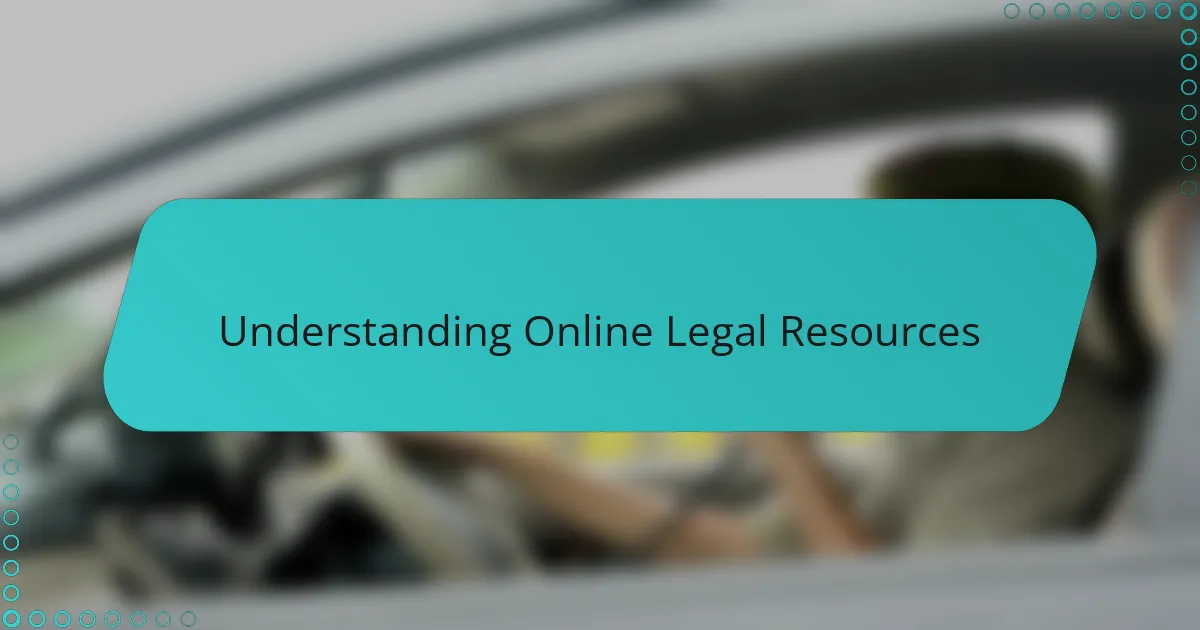
Understanding Online Legal Resources
When I first started using online legal resources, I was surprised by how vast and varied they are—from government websites to legal blogs and case databases. Have you ever felt overwhelmed scrolling through endless pages, wondering which sources you can truly trust? That feeling is common, and it highlights the importance of understanding the difference between official, reliable platforms and more informal or opinionated ones.
In my experience, online legal resources can be incredibly empowering if you know how to navigate them. For instance, accessing statutes or court opinions directly online saved me countless trips to the law library. But it’s not just about convenience; it’s about knowing which tools provide accurate, up-to-date information that supports your legal advocacy effectively.
I often reflect on the first time I used an online legal database—how empowering it felt to find exact case law without expert assistance. Isn’t it amazing how technology can put complex legal knowledge in our hands? Yet, that power comes with a responsibility to stay critical, verify details, and never take information at face value. Understanding these nuances makes all the difference.
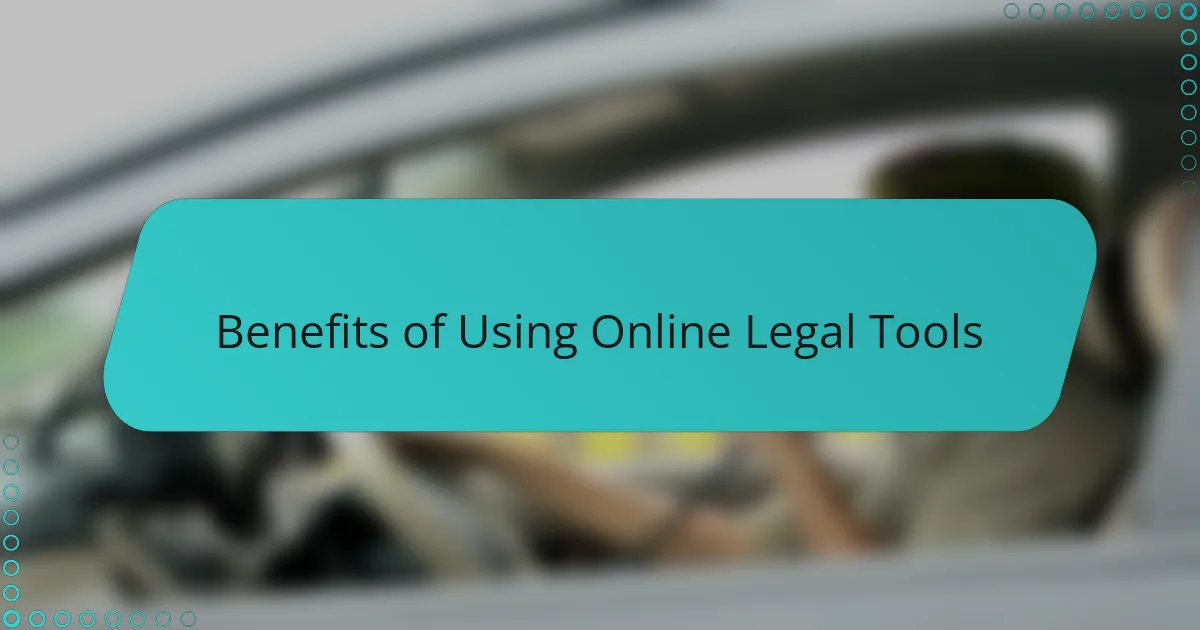
Benefits of Using Online Legal Tools
What I appreciate most about online legal tools is their incredible accessibility. At times when I was pressed for time or couldn’t make it to a physical library, these tools offered immediate answers, saving me both effort and frustration. Don’t you find it reassuring to have trusted legal information just a few clicks away, regardless of your location?
Another benefit that stands out is how these tools can boost confidence. I remember feeling nervous about drafting a legal brief until I discovered templates and guidance available online. Having that structure at hand made the seemingly daunting task much more manageable. Have you ever felt that a well-organized resource can turn a rocky start into steady progress?
Finally, online legal tools often provide a level of up-to-date information that’s hard to match elsewhere. I’ve seen firsthand how quickly laws and interpretations can change, and relying on outdated print materials simply doesn’t cut it. With online databases updated regularly, I’m more confident that I’m building my case on accurate ground rather than outdated assumptions. How important is staying current in your legal advocacy? For me, it’s non-negotiable.
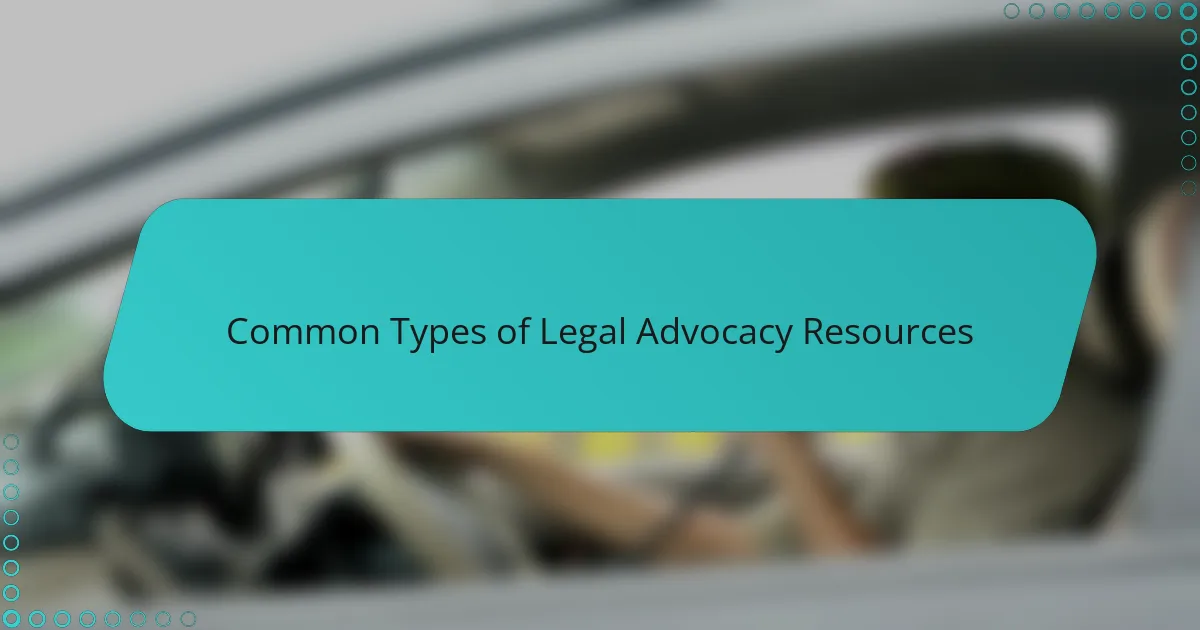
Common Types of Legal Advocacy Resources
One of the most common types of legal advocacy resources I’ve relied on are online case law databases. They give direct access to court decisions, which I find invaluable when building arguments or understanding how laws have been interpreted over time. Have you ever dug through a court opinion and felt that rush of clarity when a judge’s reasoning perfectly supports your point?
Another resource I frequently turn to are statutory compilation sites, where you can read the exact language of laws and regulations. It’s like having the law book open right in front of you but without the heavy lifting of finding it in a library. From my experience, seeing the precise wording helps me avoid misunderstandings and strengthen my advocacy work.
I can’t forget about legal aid organizations’ websites either, which often provide helpful guides, FAQs, and even contact info for pro bono services. When I was once stuck on a tricky legal issue, these resources felt like a lifeline, offering both expert advice and practical steps I could take. Have you ever felt the comfort of knowing there’s guidance specifically tailored to support you?
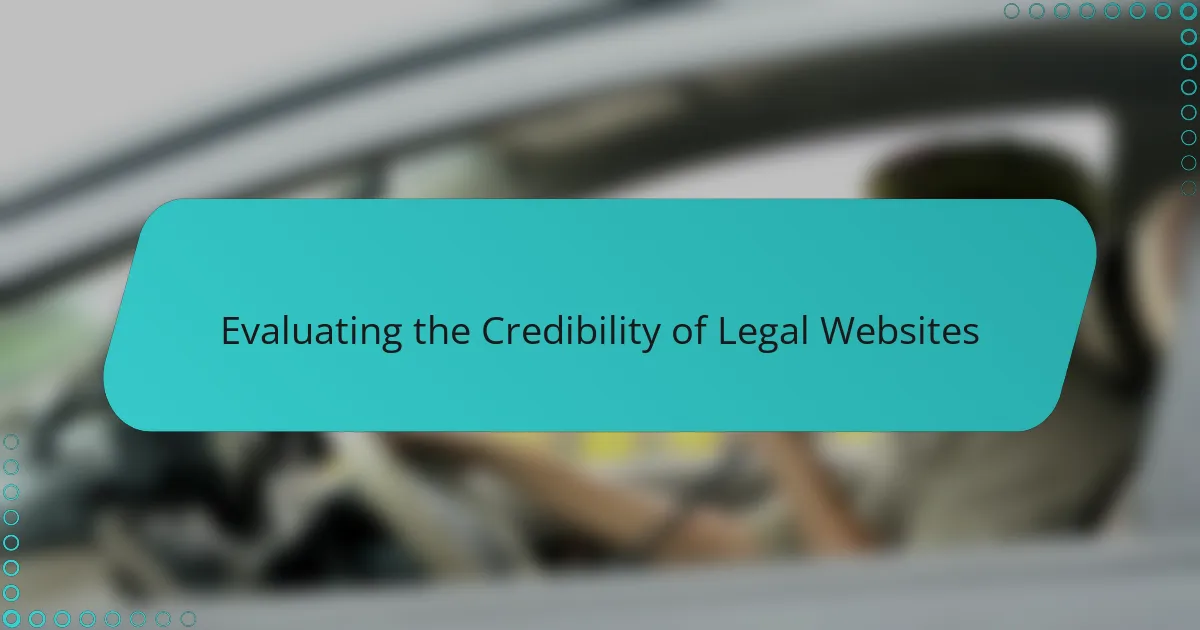
Evaluating the Credibility of Legal Websites
When I first started assessing legal websites, I quickly realized that not all sources are created equal. Have you ever clicked on a site that looked professional but left you doubting the accuracy of the information? That experience taught me to check for credentials, such as affiliations with recognized legal institutions or government entities, which often signal reliability.
I’ve also learned to scrutinize the currency of the information posted. Laws change, sometimes rapidly, and nothing frustrates me more than relying on outdated legal advice. When a website clearly displays the last update date or references recent cases, I instantly feel more confident in the resource’s credibility.
Another red flag for me is the presence of biased or opinionated language without proper citations. Isn’t it tempting to trust a persuasive article, yet I always remind myself to look for evidence-backed content. From personal experience, cross-referencing facts across multiple reputable sites has saved me from costly misunderstandings in my advocacy work.
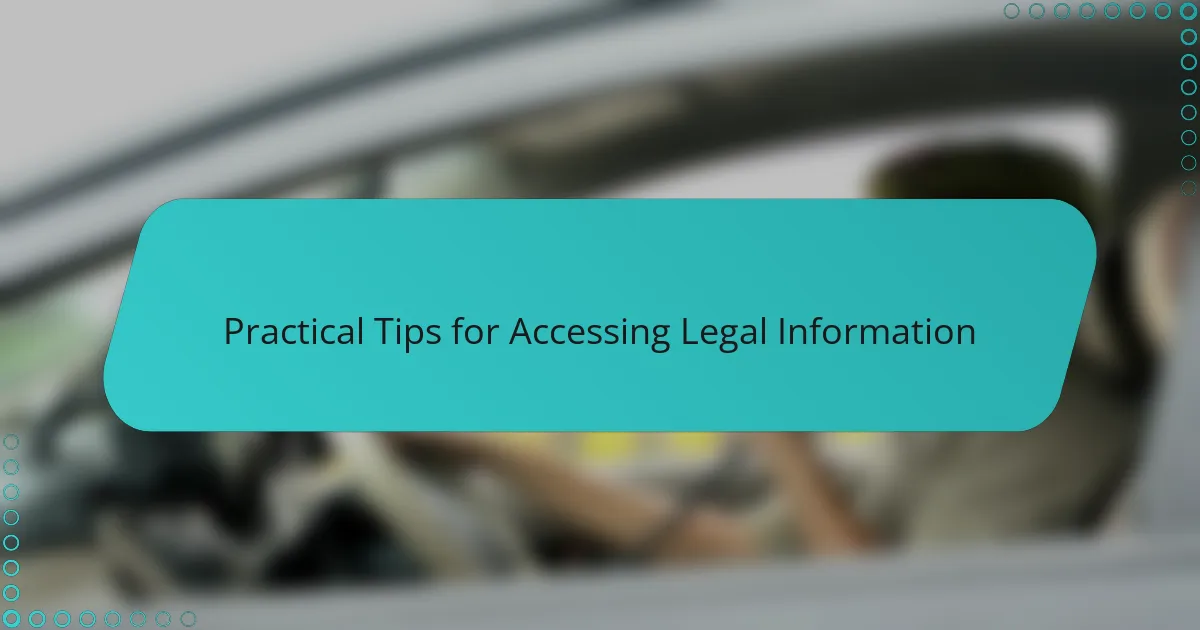
Practical Tips for Accessing Legal Information
One practical tip I always follow is to start with official government websites when searching for legal information. I remember early on how confusing it was to sift through countless pages until I realized these sites tend to offer the most accurate and updated laws. Have you noticed how much easier it feels to trust data straight from the source?
Another habit I picked up is bookmarking trusted databases and frequently checking their update schedules. It’s frustrating to act on outdated rules—I’ve been there, feeling stuck because a law had changed but the site hadn’t caught up yet. Don’t you find it reassuring when you see a clear “last updated” date? It’s like a small but powerful indicator that someone’s looking out for accuracy.
Whenever I tackle a tricky legal question, I make it a point to cross-reference information across multiple reputable resources. I’ve learned that relying on just one site can be risky; checking several perspectives helps me feel more certain before moving forward. Have you ever caught a discrepancy that made you double-check? That moment taught me the value of not taking information at face value.
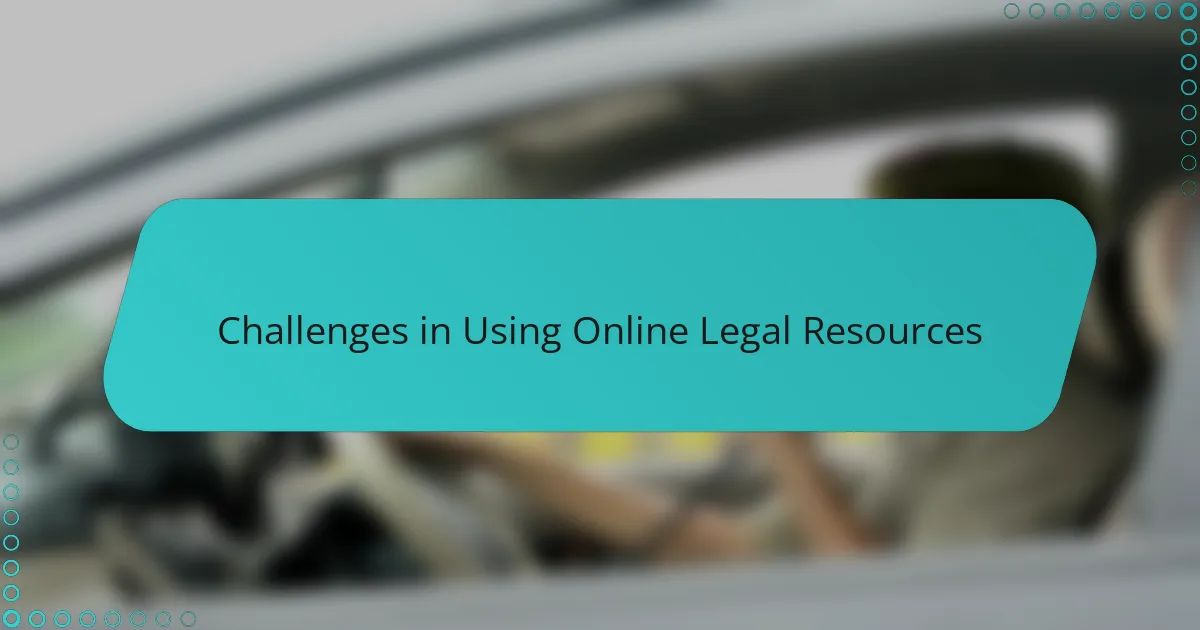
Challenges in Using Online Legal Resources
One challenge I often face with online legal resources is the sheer volume of information. Sometimes, I find myself drowning in legal jargon and endless links, making it hard to pinpoint exactly what I need. Have you ever spent hours scrolling only to feel more confused than when you started? That’s a common frustration and a real hurdle for anyone trying to advocate effectively.
Another issue that often trips me up is the reliability of the content. Not every site updates its materials regularly, and outdated laws can lead to costly mistakes. I remember a time when I almost relied on an old statute that had been repealed—talk about a close call. How do you verify that the information you’re reading is current? For me, it’s about checking dates and cross-referencing multiple sources.
Lastly, accessibility can be a hidden challenge. Some legal databases require paid subscriptions or have complicated user interfaces that make navigation daunting. I’ve felt that sense of defeat trying to access a critical case law document only to hit a paywall. Have you encountered that? It’s a reminder that, while online tools are powerful, they’re not always as user-friendly or inclusive as we’d hope.
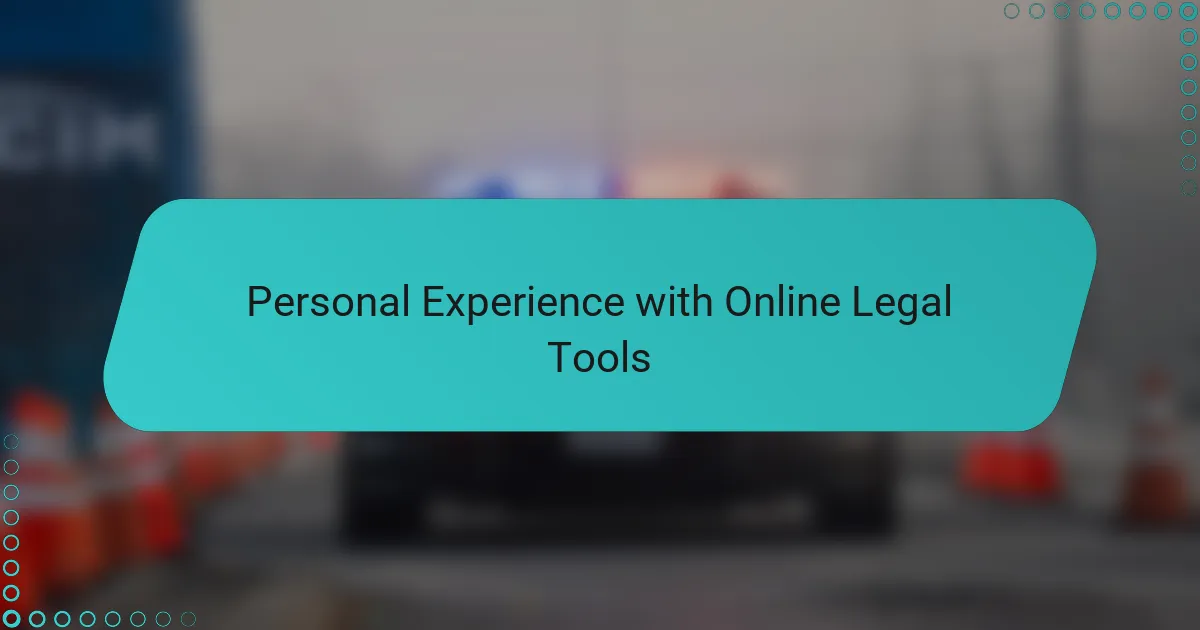
Personal Experience with Online Legal Tools
Using online legal tools has been a journey of discovery for me. I recall the first time I used a digital case law database; the thrill of typing in a keyword and instantly finding relevant judgments was unlike anything I’d experienced in traditional research. Have you ever felt that mix of excitement and relief when technology suddenly makes a daunting task feel approachable?
At times, though, I’ve found myself stuck searching for documents behind paywalls or struggling with complicated website layouts. It can be frustrating, especially when you’re in a hurry or facing a tight deadline. I’ve learned to prepare for these hurdles by having backup resources ready and taking a moment to breathe before diving back in.
What’s really made a difference for me is the consistent habit of verifying what I find online. There was this one occasion when a quick glance at a statute on an unofficial blog nearly led me astray. But cross-checking with an official source saved the day. Don’t you think it’s worth that extra effort to ensure your advocacy is built on solid ground?
